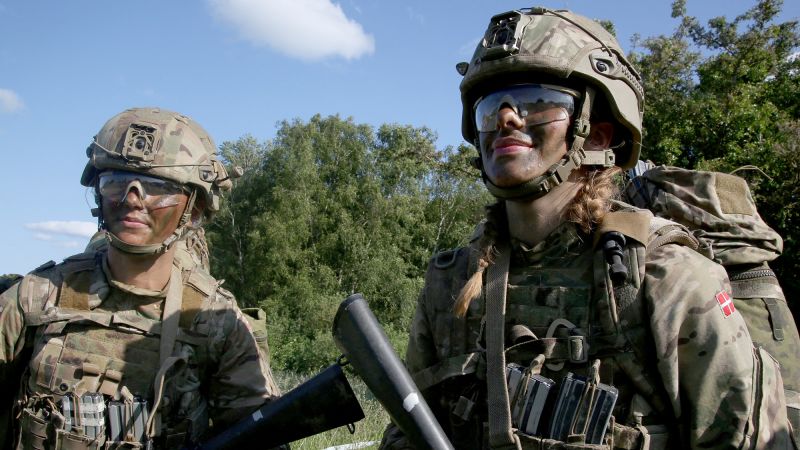Denmark has taken a significant step in bolstering its national defense by expanding military conscription to include women. This decision, announced on Tuesday, comes as the Nordic nation seeks to enhance its military capabilities in response to escalating security concerns across Europe. Under the new law passed by Denmark’s parliament in June 2023, women turning 18 after July 1, 2025, will be required to register for assessment days for potential military conscription, aligning their obligations with those already in place for men.
Until now, women have been able to join Denmark’s military voluntarily, comprising approximately 24% of all recruits last year. “In the world situation we’re in right now, it’s necessary to have more conscripts, and I think that women should contribute to that equally, as men do,” said Katrine, a recruit in the Danish Royal Life Guard, in an interview with Reuters.
Adjusting to a New Reality
The inclusion of women in mandatory conscription marks a pivotal change in Denmark’s military policy. Traditionally, the nation has relied on volunteers who are then selected for service through a lottery system if necessary. However, the current global security landscape has prompted a reevaluation of this approach.
To accommodate the influx of female conscripts, the Danish armed forces are making significant adjustments in barracks and equipment. “There are different things that they need to improve, especially in terms of equipment. Right now, it’s made for men, so perhaps the rucksacks are a bit too large and the uniforms are large as well,” Katrine noted.
Broader Defense Strategy
This development follows Denmark’s recent agreement with NATO allies to increase defense spending. The nation plans to gradually extend the conscription period from four months to 11 months by 2026. Moreover, Denmark aims to raise the number of recruits undergoing military service from around 5,000 currently to 7,500 by 2033.
The move represents a strategic effort to strengthen Denmark’s military readiness amid heightened tensions in Europe. As part of this broader defense strategy, Denmark is also focusing on modernizing its military infrastructure and enhancing its capabilities to respond to potential threats.
Historical Context and Expert Opinions
Denmark’s decision to conscript women is not without precedent. Several countries, including Norway and Israel, have already implemented similar measures, citing the need for a more inclusive and robust defense force. Experts argue that integrating women into conscription can enhance military effectiveness by drawing from a wider pool of talent and perspectives.
“Gender equality in military service is a logical step forward for countries looking to maximize their defense potential,” said Dr. Lars Jensen, a military analyst at the University of Copenhagen. “Denmark’s decision is a reflection of changing societal norms and the evolving nature of modern warfare.”
Implications for the Future
The implications of this policy shift are manifold. In addition to strengthening Denmark’s military capabilities, the inclusion of women in conscription may have broader social and cultural impacts. It challenges traditional gender roles and underscores the importance of equality in national service.
As Denmark prepares for this transition, the focus will likely remain on ensuring that the necessary infrastructure and support systems are in place to accommodate female conscripts. This includes not only physical adjustments in military facilities but also fostering an inclusive and supportive environment for all recruits.
Looking ahead, Denmark’s approach could serve as a model for other nations grappling with similar security challenges. As global tensions continue to rise, the need for comprehensive and inclusive defense strategies becomes increasingly apparent.
The next steps for Denmark involve careful planning and execution to ensure a smooth integration of women into the conscription process. As the July 2025 deadline approaches, the nation will be closely watched by both domestic and international observers eager to see the outcomes of this bold policy change.
About The Author
 Italian “Ghost Children” Found in Isolation: Parents Claim Protective Intentions
Italian “Ghost Children” Found in Isolation: Parents Claim Protective Intentions Paramount Settles $16 Million Lawsuit with Trump Over ’60 Minutes’ Interview
Paramount Settles $16 Million Lawsuit with Trump Over ’60 Minutes’ Interview Canadians Celebrate Canada Day with Renewed Patriotism Amid Tensions with Trump
Canadians Celebrate Canada Day with Renewed Patriotism Amid Tensions with Trump Lithuania Urges Unity Against China’s Aggression in South China Sea
Lithuania Urges Unity Against China’s Aggression in South China Sea Chief Justice John Roberts’ Strategic Influence on the Supreme Court
Chief Justice John Roberts’ Strategic Influence on the Supreme Court